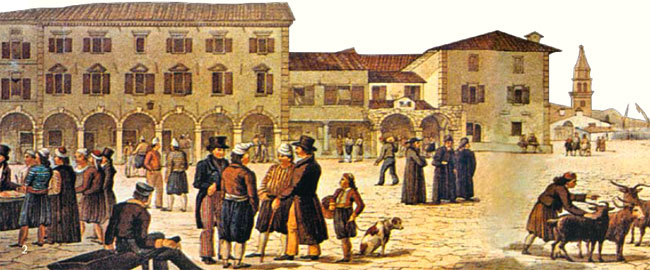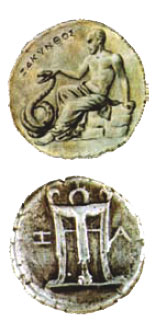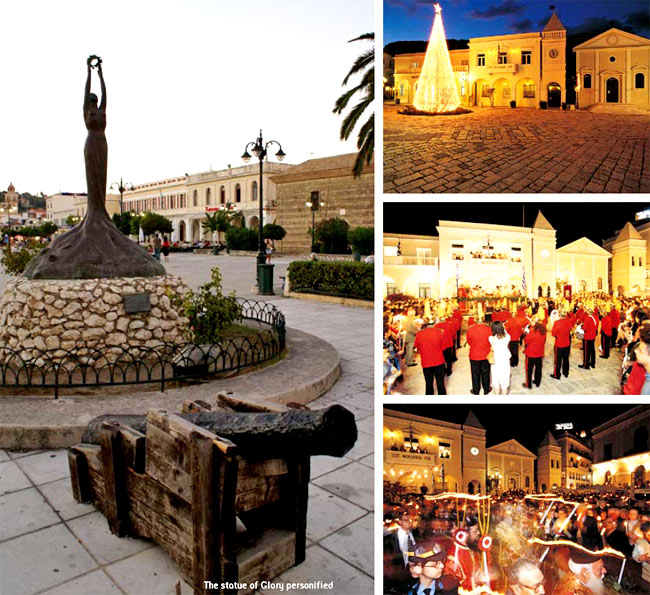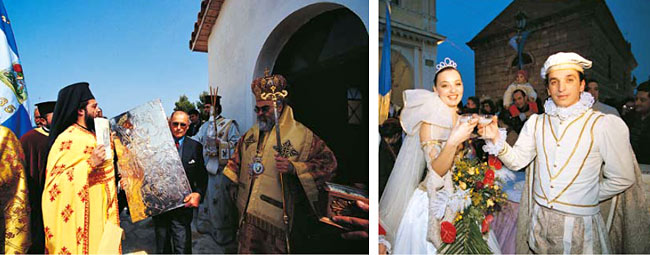History of Zakynthos
Find info about the history of Zakynthos Zante island.
An island with a rich past
The oldest traces of life that were found in the island come from the Neolithic age, and were located in the Bay of Laganas. The history of the island has its roots in antiquity: according to Pliny, the island was inhabited before 3000 B.C. and was named Yria. Near the fortress, a marble complex of divine figures was found, such as those of Apollo, Aphrodite, and Artemis, which is now located in the Tiepolo Museum in Venice. This also certifies the particular penchant of the ancient inhabitants of the island .for music
and the worship of Artemis.
The island received the name of Zakynthos, as Homer mentions, from Zakynthos, son of King Dardanos of Troy. Zakynthos reached the island from the Arcadian town of Psofida around 1500 B.C. and gave his name to the new city-state. The colonists who followed him named the acropolis of the island Psofida in order to remember their homeland. The descendants of Zakynthos created a noteworthy culture and began to found colonies for their expansion, such as Zakantha in Spain, the town of Kydonies in Crete, and Fokida in the Pyrenees of Spain. In the Mycenaean era, the island formed a part of the kingdom of Ithaca. Homer called the island “yliessa”, or rich in vegetation.
The geographic location, the fertile soil, and the sources of tar of the island played a significant role in its economic development in the 6th century B.C., with the result that in the 6th century B.C. silver coinage was struck depicting the tripod, a symbol sacred to Apollo, which was followed by the lyre in the 5th century B.C. For approximately seven centuries, the island experienced free democratic life. In 455 B.C. Zakynthos joined the alliance led by the Athenians and after its defeat, was occupied by the Lacedaemonians with the result being a change from its democratic constitution to an oligarchic one. During the Persian Wars, Zakynthos kept a neutral stance, while during the period of the Roman Empire, it was integrated within the Roman province of Achaea. In parallel, the spread of Christianity began in 34 A.D., according to one version, begun by Mary Magdalene, or by Saint Beatrice, according to another tradition.
With the founding of the Byzantine Empire, Zakynthos belonged to the province of Illyria, however, without receiving particular care or protection. Thus, it was sacked by incursions of pirates and hopeful conquerors. With the Crusades, the Ionian Islands would undergo new adventures. At the end of the 12th century, the island became a possession of the Orsini family of French counts, and later of the Angevins (the kings of Naples) and finally of the Tocchi (Florentine princes). In 1485, the Venetians occupied the islands after diplomatic pressure directed against the Turks. The Venetian occupation provided Zakynthos with the stability and the opportunity for development that it had been denied for
centuries. The peace secured by the power of Venice, for the first time, ensured the possibility of the island flourishing in economic and cultural terms.


The inhabitants were divided into three classes, the nobles (nobili), the bourgeoisie (civili), and the populace (poporali). Only the nobles were registered in the Golden Book (libro d’ oro) and had political rights. In 1797 the French republicans arrived in Zakynthos and were welcomed with enthusiasm. With an enthusiastic celebration, they burned the Libro d’ oro in Agios Markos Square. The French occupation lasted 15 months. In 1798, a joint Russo-Turkish fleet, commanded by the Russian Admiral Usakov, arrived in Zakynthos and occupied the island.
In 1800 a piece treaty was signed between Russia and Turkey and the founding of an independent state named “The State of the Seven Islands” was decided. The Greek language became official and Orthodox Christianity was established as the official religion. The State of the Seven Islands, which was the first independent Greek state in modern history, lasted for seven years. In 1807 French troops occupied the Ionian Islands. Two years later, in 1809, the British Navy occupied Zakynthos. The British occupation (1809-1864) was the last period of occupation before union with Greece.
With the outbreak of the Greek War for Independence in 1821, the Ionian islanders openly and actively supported the risen Greeks. After their liberation from the Turks and the founding of the Greek state, the demand of union between the Ionian Islands and the rest of Greece was expressed intensely. On May 21, 1864, the Greek flag was definitively raised on the island. During the Second World War, the island was originally occupied by the Italians and later by the Germans.
A few years later, in 1953, a destructive earthquake that was followed by an extensive fire razed the town of Zakynthos. Thus, historical buildings and churches were lost, together with the treasures that they contained. The town was rebuilt according to strict earthquake safety regulations, with an effort at the same time to preserve some of its old character.






 Plaza Hotel
Plaza Hotel